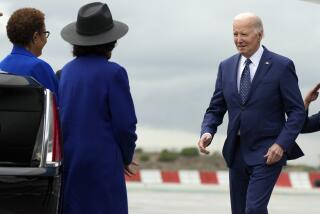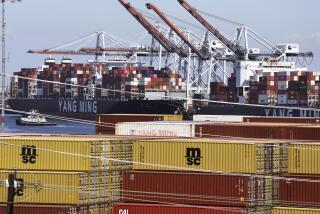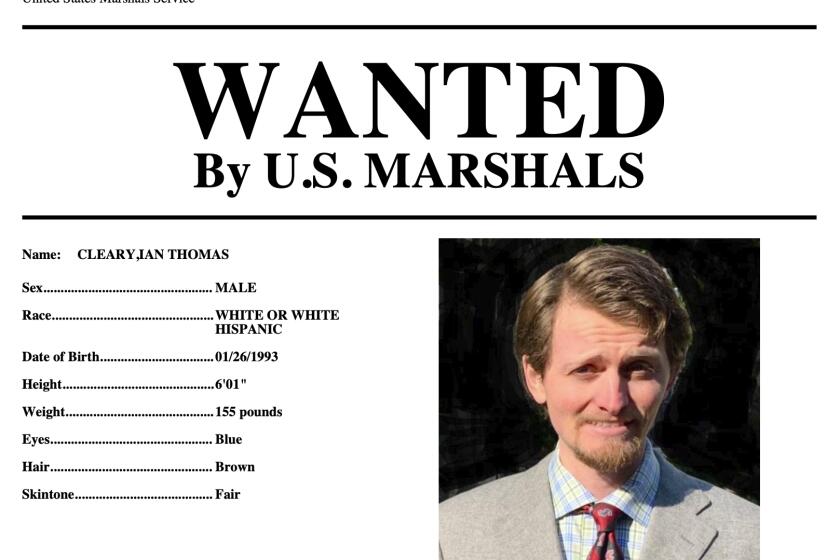Coast Guard Gets Lifeline
For years, tight budgets have reduced the Coast Guard to protecting the nation’s ports with a fleet older than Argentina’s navy and a uniformed force no bigger than it was in the 1960s. It has had to forgo patrolling for drug smugglers and illegal fishing boats just so it could pay its fuel bills.
But the Rodney Dangerfield of the nation’s defense network has been getting a lot more respect since the Sept. 11 terrorist attacks elevated its role. White House budget director Mitchell E. Daniels Jr., conferring new status on the aging agency, said: “Clearly, the Coast Guard is a principal pillar of the new homeland security.”
From the Pentagon to the Centers for Disease Control and Prevention, the new budget will be generous to agencies that fight terrorism at home and abroad, White House officials say. For the Coast Guard, the administration is considering asking Congress for about $6 billion in 2003, up from $5 billion this year.
The billion-dollar increase would help the Coast Guard meet its expanded responsibilities in the short term, said Loren Thompson, a defense analyst at the Lexington Institute, a conservative think tank in Arlington, Va.
“What it won’t do,” he said, “is begin modernizing a decrepit fleet.”
The Coast Guard’s mission includes patrolling for threats along 95,000 miles of coastline and safeguarding the nation from 6.5 million passengers and millions of cargo containers arriving at U.S. ports every year.
All the while, it must carry out a host of secondary duties, such as plucking boating accident victims from the sea, chasing drug smugglers, keeping foreign fishing vessels from poaching in U.S. waters and breaking ice floes that block waterway traffic.
The Coast Guard is doing all this with ships that, with an average age of 28 years, have become the Ramblers of the sea. In 2000, a lifeboat support snapped on a 58-year-old cutter that was tracking a foreign boat fishing in U.S. waters, sending the lifeboat and nine crew members into the Bering Sea. The crew was rescued, but the foreign vessel got away.
“I think there remains widespread ignorance of just how spread thin the service is and how unsustainable the service’s current exertions are,” said Stephen E. Flynn, a senior fellow for national security studies at the Council on Foreign Relations and a Coast Guard commander himself.
At the Los Angeles and Long Beach port, the nation’s largest, the need is acute, according to Capt. J.M. Holmes, the Coast Guard’s commanding officer there. He said the Guard’s posture shifted from passive to active on Sept. 11.
“Like a fire department, we used to have guys waiting for something terrible to happen so they could go out and save someone,” Holmes said. “Now we are in a prevention mode, like a police department, and spending a huge amount of our budget on homeland security. We have to have boats in the water at all times so that when people drive over a port bridge and look down, they can see a Coast Guard cutter.”
Unlike many port commanders, Holmes boasts of a new coastal fleet: “We just got four brand-new coastal patrol boats, and we’re replacing our 41-foot utility boats. But our deep-water fleet of 210-foot and 270-foot boats is very, very old and technically behind the times.”
And Holmes’ resources are stretched to the limit.
“We’ve been running our people, boats and equipment far harder than they are supposed to be run,” he said. “But as we extend the nation’s virtual border farther out to sea, we need to enforce our deep-water program with new high-tech boats and equipment to stop the bad guys before they get to shore.”
The Coast Guard patrols the harbor 24 hours a day, and it escorts all large passenger cruise ships to dock. It also checks lists of passengers, crews and cargo arriving at ports, and boards vessels that it considers high-risk.
To better react in emergencies, the Coast Guard is creating small-boat units that will be strategically located at certain port cities, including Los Angeles.
“Each of these units will consist of at least six small, fast boats, and they’ll be rapidly deployable in the event of an increased risk,” Holmes said. “If something happened at San Francisco or any West Coast port, we’d be able to get the unit there in a hurry.”
Flynn cautioned that the Coast Guard’s few advocates in Congress have tended to provide sporadic infusions of cash for particular programs of interest to the voters back home, such as drug and migrant interdiction and fisheries protection. “But there are no political points for maintaining and modernizing the Guard’s ships, aircraft and communications or for training and housing the people who carry out those missions.”
For 2002, Congress approved a 9% increase in the Coast Guard budget--and it provided $209 million more in post-Sept. 11 emergency funds. That brought the Coast Guard’s annual budget up to $5 billion, one-third of the amount Congress spent to bail out financially strapped commercial airlines after Sept. 11.
Rep. William D. Delahunt (D-Mass.), a former guardsman, said the Sept. 11 attacks should provide all the reason Congress needs to bring the Coast Guard into the 21st century.
“I understand we’ve got to be concerned about deficits,” he said. “But you can’t do this on the cheap. We were doing it on the cheap before Sept. 11.”
Steven Schwadron, Delahunt’s chief of staff, added: “The problem over the years is that the Coast Guard has been the poor sister to the Pentagon.”
“It is essentially a public policy orphan,” Flynn said. “Historically, there have been no powerful constituencies in either the executive or legislative branches who advocated for the service’s overall vitality.”
Some have proposed bringing the Coast Guard--along with a number of other federal agencies involved in homeland defense--under the president’s Office of Homeland Security. It currently is part of the Department of Transportation.
The Coast Guard’s uniformed force of 35,952 is about the same size as it was in 1967. Staffing hit a peak of 39,424 in 1992 before a 12% downsizing in 1996.
“A plus-up of 10% would essentially arrest the downward spiral the service was in prior to Sept. 11 without providing the nation much more in the way of additional capacity to advance maritime and port security,” Flynn said. He estimated that the service needed a 60% to 70% increase over the next five years.
Since Sept. 11, the Coast Guard has scaled back its efforts to catch drug smugglers and enforce fisheries laws to better safeguard harbors against terrorists, according to a congressional report.
Daniels, the White House budget director, said he was confident that the Coast Guard could fulfill its traditional missions as well as its expanded role in homeland defense.
Rep. Howard Coble (R-N.C.), a former guardsman, urged Coast Guard leaders to be less timid in their quest for more dollars.
“The Coast Guard has been like the unwelcome stepchild at a family reunion,” he said. “That may change now.”
*
Simon reported from Washington, Sahagun from Los Angeles.
More to Read
Start your day right
Sign up for Essential California for news, features and recommendations from the L.A. Times and beyond in your inbox six days a week.
You may occasionally receive promotional content from the Los Angeles Times.








